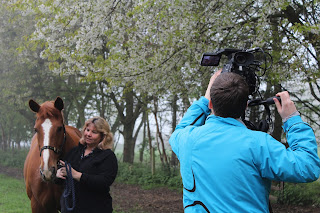Having a well-trained and compassionate vet nurse working in
a clinic is important for both the smooth day to day running of the practice
and also patient welfare. We are fortunate in the UK that veterinary nursing is
a recognised profession, has a solid training programme in place and that the
protected title is, hopefully, on its way. But what happens when a country has
no such dedicated nursing support in place in its clinics?
JMICAWE veterinary nurse Hayley Walters has lived and worked
in several developing countries and visited numerous vet schools, teaching
hospitals and first opinion practices and noted that while many of the staff
are incredibly knowledgeable and passionate about their patients and profession,
there can often be a noticeable difference in the level of care an animal
receives during surgery and in the recovery period after. Basic nursing, such
as providing a comfortable bed, maintaining a good hydration status or being
able to recognise and treat pain, is often absent and animals can be left
compromised through benign neglect. With a lack of training or understanding of
patients’ needs and few staff solely dedicated to inpatient care, the problem can
be seen in even the most well-meaning of practices.
On
the 11th of November this year Hayley and Heather Bacon will be
teaming up with VN Karen Hibbel and vet Andrew Coe from the Edinburgh Napier
University and taking 8 student veterinary nurses to India for two weeks to
Kerala Veterinary Animal Science University, one of India’s most respected
veterinary universities. This will be
the first time this has ever happened and will be mutually beneficial for the
British SVNs and the Indian vet students, technicians and lecturers who are
currently responsible for inpatient acre. The British SVNs will get the
opportunity to experience a different culture whilst nursing in challenging
situations often with limited resources, and the Indian vet students will learn
the newest nursing techniques, pain recognition and how to implement an
inpatient care plan.
Dr
David Smith, Veterinary Nursing Programme Leader at Edinburgh Napier
University, said: “Developments within veterinary training institutes across
the world have often concentrated on investments in technologically advanced
equipment and training of veterinary surgeons. However, good welfare of
hospitalised animals starts before the consultation room and long after medical
or surgical intervention; this is the domain of the veterinary nurse.”
The 8
SVNs had to go through a Dragon’s Den style interview process and have been
fundraising hard to pay for the trip. One of those going is Kirsty Dougherty.
“Being able to enhance the lives of the individual animals we meet, even in a
small way, will be incredibly rewarding. Being able, through education and
collaboration with the Indian veterinary profession, to improve the lives and
welfare of many animals into the future, in a long-lasting and sustainable way,
would be an unbelievable privilege”.
The
objectives are to improve patient welfare through the nursing profession and
ultimately collaborate on India’s first ever veterinary nurse training
programme. They will be working in the veterinary hospital every day and giving
nursing workshops and lectures in the evening to all staff and students. We
hope that when they leave they will realise just how invaluable VNs are to the
clinic, how fundamental they are to improving patient welfare and hopefully
miss them desperately!










